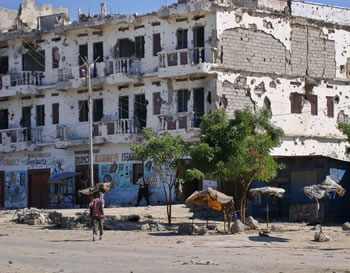THE FUND FOR PEACE
FOR IMMEDIATE RELEASE
Monday, June 20, 2011
FOR IMMEDIATE RELEASE
Monday, June 20, 2011
2011 Failed States Index Released:
Somalia ranked most troubled state; Finland takes best position
Somalia ranked most troubled state; Finland takes best position
 War-ravaged Mogadishu, Somalia |
The 2011 FSI ranks Somalia as number one for the fourth consecutive year, citing widespread lawlessness, ineffective government, terrorism, insurgency, crime, and well-publicized pirate attacks against foreign vessels.
Finland has displaced Norway from the best position for the first time. Slight fluctuations in demographic and economic indicators, though minimal, lowered Norway’s scores, allowing Finland, with continued its stability, to slip in front of its Nordic neighbor.
The FSI ranks 177 countries using 12 social, economic, and political indicators of pressure on the state, along with over 100 sub-indicators. These include such issues as Uneven Development, State Legitimacy, Group Grievance, and Human Rights. Each indicator is rated on a scale of 1-10, based on the analysis of millions of publicly available documents, other quantitative data, and assessments by analysts. A high score indicates high pressure on the state, and therefore a higher risk of instability.
Other notable changes this year include countries affected by natural disasters. Haiti, which suffered the greatest decline in the 2011 FSI, shot to fifth place in the index, largely as a result of the January 2010 earthquake and its aftermath. Natural disasters, including earthquakes, floods and drought, likewise affected scores in countries as diverse as New Zealand, Chile, Benin and Nigeria.
Greece and Ireland declined from the 2010 FSI as economic crisis have adversely affected their economic indicators. A loss of confidence in the state, coinciding with the state’s lessened capacity to provide public services, have led to growing social pressures.
Georgia is the most improved nation, reaping the benefits of new accountability and transparency measures in the security sector and a government crackdown on corruption. A reduced threat of conflict with neighboring Russia further improved scores.
Ken Brill, the President of The Fund for Peace, said the FSI’s strength and value year-to-year was its consistent and empirically-based approach. He characterized the FSI rankings as providing a quick snapshot of how well states are coping with the variety of pressures with which they must contend. He added that pressures on governments ripple across economic, political and social indicators; sometimes necessary steps taken to address one indicator adversely affect another. The 2011 FSI shows, for example, in the case of Greece, austerity measures taken to respond to economic problems produced political and social pressures that moved it up the FSI rankings. These complicated interrelationships can be better understood through the holistic assessment framework used by the FfP.
The Failed States Index 2011 will be formally launched at an event held in collaboration with Business Executives for National Security on the morning of Wednesday, June 29 at the National Press Club in Washington, D.C. Chairman of the Joint Chiefs of Staff, Admiral Michael Mullen will be providing the keynote address.
The Fund for Peace is an independent research and educational organization based in Washington, DC, with the mission to prevent conflict and promote sustainable security. Visit The Fund for Peace website at www.fundforpeace.org for more information on its work.
The Fund for Peace. 1720 I Street NW, 7th Floor. Washington, D.C. 20006, USA.








.jpg)












No comments:
Post a Comment